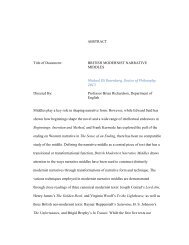PSYCHOTHERAPY ENGAGERS VERSUS NON-ENGAGERS
PSYCHOTHERAPY ENGAGERS VERSUS NON-ENGAGERS
PSYCHOTHERAPY ENGAGERS VERSUS NON-ENGAGERS
You also want an ePaper? Increase the reach of your titles
YUMPU automatically turns print PDFs into web optimized ePapers that Google loves.
Chapter 6: Discussion<br />
The present study examined therapist helping skills associated with<br />
psychotherapy engagement. Specifically, overall proportions of helping skills used in<br />
intake sessions, as well as proportions of helping skills used across thirds of intake<br />
sessions, were analyzed. In addition, a number of other variables were examined to help<br />
to explicate the results.<br />
Overall Helping Skills and Psychotherapy Engagement<br />
Descriptively, of the 21 skills, the most frequently used skills in the intake<br />
sessions overall were: information about the helping process (28% of all skills used),<br />
restatements (19%), and closed questions (19%). Moderately-used skills in the intake<br />
included approval-reassurance (10%), open questions about thoughts (7%), and<br />
information-facts/data/opinions (7%). Less frequently used skills in the intake included<br />
reflections of feeling (3%), immediacy (3%), and disclosure-miscellaneous (1%). Rarely-<br />
used skills in the intake (less than 1%) included open questions about feelings, directives,<br />
open questions about insight, process advisement, challenge, interpretation, disclosure of<br />
feelings, information providing feedback about the client and statements not relevant to<br />
the helping situation (i.e. skills falling into the Other category). Never-used or skills in<br />
the intake were open questions about action, disclosure of insight, and disclosure of<br />
action.<br />
Therapists did not significantly differ in their use of the helping skills with<br />
engagers versus non-engagers. This null finding contrasts to Tryon’s (2003) findings that<br />
therapists used statistically significantly more information and fewer minimal<br />
encouragers with engagers than with non-engagers (the present study did not include<br />
107

















